(1-2H)Acetaldehyde
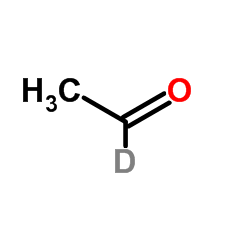
(1-2H)Acetaldehyde structure
|
Common Name | (1-2H)Acetaldehyde | ||
|---|---|---|---|---|
| CAS Number | 4122-13-8 | Molecular Weight | 45.059 | |
| Density | 0.7±0.1 g/cm3 | Boiling Point | 18.6±3.0 °C at 760 mmHg | |
| Molecular Formula | C2H3DO | Melting Point | N/A | |
| MSDS | N/A | Flash Point | -40.0±0.0 °C | |
| Name | 1-deuterioethanone |
|---|---|
| Synonym | More Synonyms |
| Density | 0.7±0.1 g/cm3 |
|---|---|
| Boiling Point | 18.6±3.0 °C at 760 mmHg |
| Molecular Formula | C2H3DO |
| Molecular Weight | 45.059 |
| Flash Point | -40.0±0.0 °C |
| Exact Mass | 45.032490 |
| PSA | 17.07000 |
| LogP | -0.16 |
| Vapour Pressure | 964.5±0.0 mmHg at 25°C |
| Index of Refraction | 1.315 |
|
Version 1.2
Regulation (EC) No 1907/2006 1 - Product and Company Information Product NameACET(ALDEHYDE-D) 98+ ATOM % D 2 - Hazards Identification SPECIAL INDICATION OF HAZARDS TO HUMANS AND THE ENVIRONMENT May cause cancer. May cause heritable genetic damage. Extremely
flammable. Harmful by inhalation, in contact with skin and if swallowed. Irritating to eyes, respiratory system and skin. 3 - Composition/Information on Ingredients Product NameCAS #EC noAnnex I Index Number ACET(ALDEHYDE-D) 98+ ATOM % D4122-13-8 223-921-1 None FormulaC2H3DO Molecular Weight 45,0600 AMU 4 - First Aid Measures AFTER INHALATION If inhaled, remove to fresh air. If not breathing give artificial respiration. If breathing is difficult, give oxygen. AFTER INGESTION If swallowed, wash out mouth with water provided person is conscious. Call a physician. 5 - Fire Fighting Measures EXTINGUISHING MEDIA Suitable: For small (incipient) fires, use media such as "alcohol" foam, dry chemical, or carbon dioxide. For large fires, apply water from as far as possible. Use very large quantities (flooding) of water applied as a mist or spray; solid streams of water may be ineffective. Cool all affected containers with flooding quantities of water. SIGMAwww.molbase.com SPECIAL RISKS Specific Hazard(s): Extremely flammable. Vapor may travel considerable distance to source of ignition and flash back. Explosion Hazards: Vapor may travel considerable distance to source of ignition and flash back. SPECIAL PROTECTIVE EQUIPMENT FOR FIREFIGHTERS Wear self-contained breathing apparatus and protective clothing to prevent contact with skin and eyes. 6 - Accidental Release Measures PERSONAL PRECAUTION PROCEDURES TO BE FOLLOWED IN CASE OF LEAK OR SPILL Shut off all sources of ignition. Evacuate area. METHODS FOR CLEANING UP Cover with an activated carbon adsorbent, take up and place in closed containers. Transport outdoors. 7 - Handling and Storage HANDLING Directions for Safe Handling: Do not breathe vapor. Avoid contact with eyes, skin, and clothing. Avoid prolonged or repeated exposure. STORAGE Conditions of Storage: Keep tightly closed. Keep away from heat and open flame. Store under nitrogen. Unsuitable: Forms explosive peroxides on prolonged storage Store at -20°C SPECIAL REQUIREMENTS: May develop pressure. Open carefully. Air sensitive. 8 - Exposure Controls / Personal Protection ENGINEERING CONTROLS Use only in a chemical fume hood. Safety shower and eye bath. GENERAL HYGIENE MEASURES Wash contaminated clothing before reuse. Wash thoroughly after handling. PERSONAL PROTECTIVE EQUIPMENT Special Protective Measures: Wear appropriate government approved respirator, chemical-resistant gloves, safety goggles, other protective clothing. 9 - Physical and Chemical Properties pH N/A BP/BP Range20,000. - 21,000 °C.760,000 mmHg MP/MP RangeN/A Flash Point- 27,000 °C.Method: closed cup FlammabilityN/A Autoignition TempN/A Oxidizing PropertiesN/A Explosive PropertiesN/A SIGMAwww.molbase.com Explosion LimitsN/A Vapor Pressure707,256000000 mmHg 20,00 °C SG/Density0,8060 g/cm3 Partition Coefficient N/A ViscosityN/A Vapor DensityN/A Saturated Vapor Conc. N/A Evaporation RateN/A Bulk DensityN/A Decomposition Temp.N/A Solvent ContentN/A Water ContentN/A Surface TensionN/A ConductivityN/A Miscellaneous DataN/A SolubilityN/A 10 - Stability and Reactivity STABILITY Conditions of Instability: May decompose on exposure to air. Materials to Avoid: Strong acids, Oxidizing agents, Reducing agents, Strong bases. HAZARDOUS DECOMPOSITION PRODUCTS Hazardous Decomposition Products: Carbon monoxide, Carbon dioxide. 11 - Toxicological Information SENSITIZATION Sensitization: May cause allergic reaction. SIGNS AND SYMPTOMS OF EXPOSURE Pulmonary edema. Effects may be delayed. Dermatitis. Nausea, headache, and vomiting. Exposure can cause: Symptoms of exposure may include burning sensation, coughing, wheezing, laryngitis, shortness of breath, headache, nausea, and vomiting. ROUTE OF EXPOSURE Eye Contact: Causes severe eye irritation. Inhalation: Material is irritating to mucous membranes and upper respiratory tract. Multiple Routes: Harmful if swallowed, inhaled, or absorbed through skin. TARGET ORGAN INFORMATION Central nervous system. Blood. Lungs. Kidneys. Liver. CHRONIC EXPOSURE - CARCINOGEN Result: Carcinogen. CHRONIC EXPOSURE - REPRODUCTIVE HAZARD Result: Overexposure may cause reproductive disorder(s) based on tests with laboratory animals. 12 - Ecological Information No data available. 13 - Disposal Considerations SIGMAwww.molbase.com SUBSTANCE DISPOSAL Burn in a chemical incinerator equipped with an afterburner and scrubber but exert extra care in igniting as this material is highly flammable. Observe all federal, state, and local environmental regulations. 14 - Transport Information RID/ADR UN#: 1089 Class: 3 PG: I Proper Shipping Name: Acetaldehyde IMDG UN#: 1089 Class: 3 PG: I Proper Shipping Name: Acetaldehyde Marine Pollutant: No Severe Marine Pollutant: No IATA UN#: 1089 Class: 3 PG: I Proper Shipping Name: Acetaldehyde Inhalation Packing Group I: No 15 - Regulatory Information CLASSIFICATION AND LABELING ACCORDING TO EU DIRECTIVES INDICATION OF DANGER: F+-T Extremely Flammable. Toxic. R-PHRASES: 45-46-12-20/21/22-36/37/38 May cause cancer. May cause heritable genetic damage. Extremely flammable. Harmful by inhalation, in contact with skin and if swallowed. Irritating to eyes, respiratory system and skin. S-PHRASES: 53-16-26-36/37/39-45 Avoid exposure - obtain special instructions before use. Keep away from sources of ignition - no smoking. In case of contact with eyes, rinse immediately with plenty of water and seek medical advice. Wear suitable protective clothing, gloves, and eye/face protection. In case of accident or if you feel unwell, seek medical advice immediately (show the label where possible). COUNTRY SPECIFIC INFORMATION Germany WGK: 3 Self-Classification 16 - Other Information WARRANTY The above information is believed to be correct but does not purport to be all inclusive and shall be used only as a guide. The information in this document is based on the present state of our knowledge and is applicable to the product with regard to SIGMAwww.molbase.com appropriate safety precautions. It does not represent any guarantee of the properties of the product. Inc., shall not be held liable for any damage resulting from handling or from contact with the above product. See reverse side of invoice or packing slip for additional terms and conditions of sale. Copyright 2010 Co. License granted to make unlimitedpaper copies for internal use only. DISCLAIMER For R&D use only. Not for drug, household or other uses. SIGMAwww.molbase.com SECTION 16 - ADDITIONAL INFORMATION N/A |
|
~% 
(1-2H)Acetaldehyde CAS#:4122-13-8 |
| Literature: Mukherjee, Jogeshwar; Banerji, Kalyan K. Indian Journal of Chemistry, Section A: Inorganic, Physical, Theoretical & Analytical, 1981 , vol. 20, # 4 p. 394 - 395 |
|
~% 
(1-2H)Acetaldehyde CAS#:4122-13-8 |
| Literature: Cederstav, Anna K.; Novak, Bruce M. Journal of the American Chemical Society, 1994 , vol. 116, # 9 p. 4073 - 4074 |
|
~% 
(1-2H)Acetaldehyde CAS#:4122-13-8
Detail
|
| Literature: Levy, Ophir; Bino, Avi Chemistry - A European Journal, 2012 , vol. 18, # 50 p. 15944 - 15947 |
|
~% 
(1-2H)Acetaldehyde CAS#:4122-13-8 |
| Literature: Lown; Chauhan Journal of Organic Chemistry, 1981 , vol. 46, # 12 p. 2479 - 2489 |
|
~% 
(1-2H)Acetaldehyde CAS#:4122-13-8
Detail
|
| Literature: Lown; Chauhan Journal of Organic Chemistry, 1981 , vol. 46, # 12 p. 2479 - 2489 |
|
~% 
(1-2H)Acetaldehyde CAS#:4122-13-8
Detail
|
| Literature: Lown; Chauhan Journal of Organic Chemistry, 1981 , vol. 46, # 12 p. 2479 - 2489 |
|
~% 
(1-2H)Acetaldehyde CAS#:4122-13-8
Detail
|
| Literature: Goodale, J. W.; Evans, D. K.; Ivanco, M.; McAlpine, Robert D. Canadian Journal of Chemistry, 1990 , vol. 68, # 8 p. 1437 - 1439 |
| Precursor 6 | |
|---|---|
| DownStream 10 | |
| (1-H)Acetaldehyde |
| CH3CDO |
| acetaldehyde-1-d1 |
| Acetaldehyde-1-d |
| deuteriated acetaldehyde |
| acetaldehyde-d1 |
| EINECS 223-921-1 |



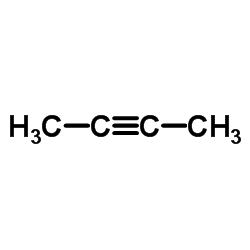

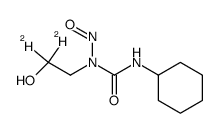
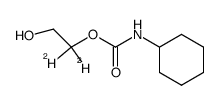
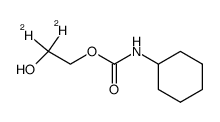
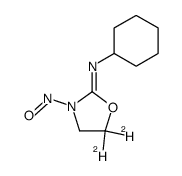
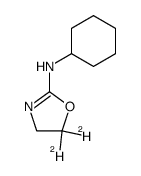
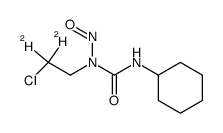


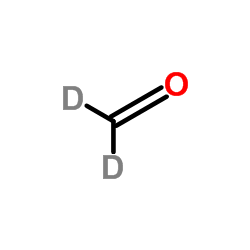

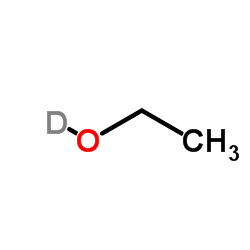 CAS#:1624-36-8
CAS#:1624-36-8 CAS#:758-12-3
CAS#:758-12-3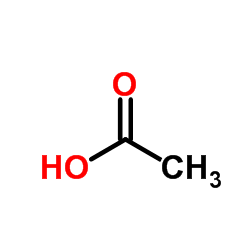 CAS#:64-19-7
CAS#:64-19-7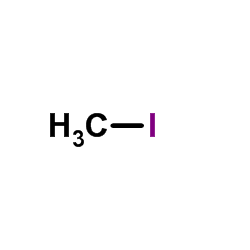 CAS#:74-88-4
CAS#:74-88-4 CAS#:3170-69-2
CAS#:3170-69-2 CAS#:2229-07-4
CAS#:2229-07-4 CAS#:2597-44-6
CAS#:2597-44-6 CAS#:24286-05-3
CAS#:24286-05-3 CAS#:676-49-3
CAS#:676-49-3